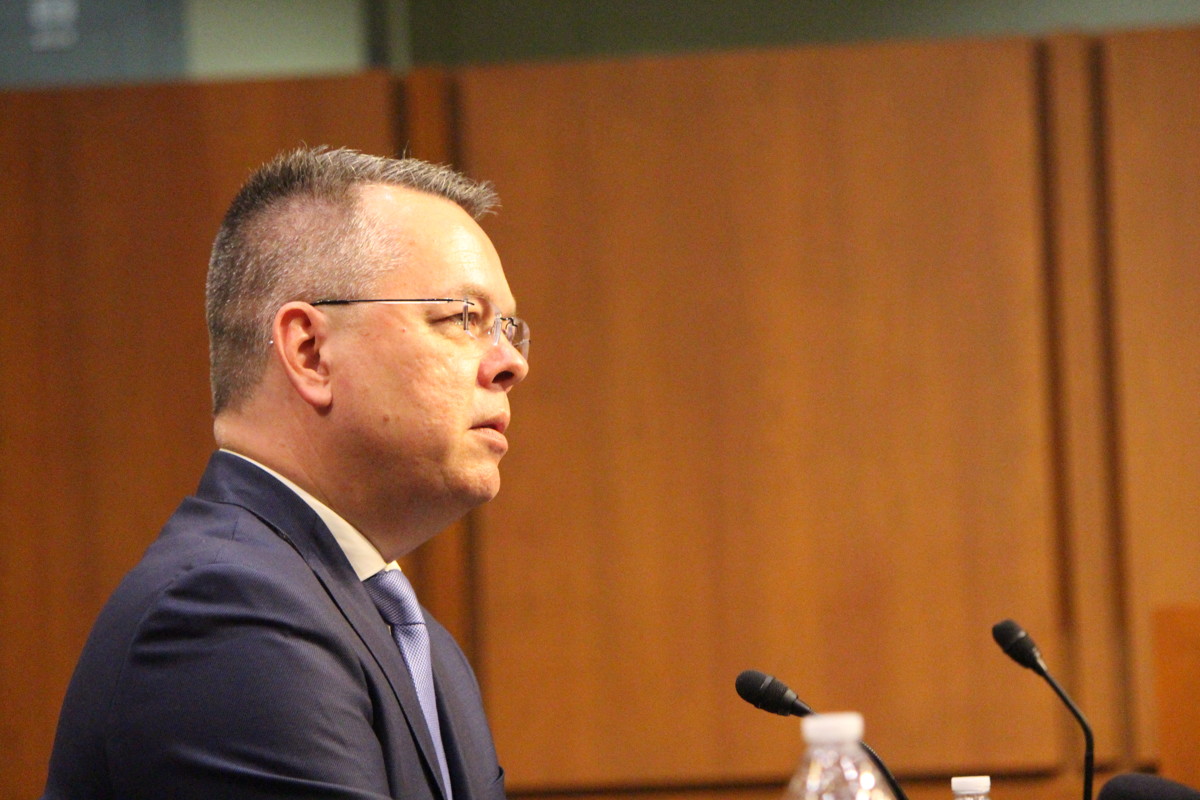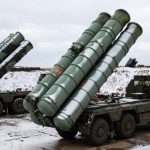Formerly jailed Pastor Andrew Brunson talked about his ordeal in Thursday’s hearing. He said as Turkish media and government continue to smear him, he loves the people and believes Turkey is ripe for “spiritual harvest.”
WASHINGTON — Five months had passed since the United States successfully pressured Turkey to release Pastor Andrew Brunson, who had been convicted of spying by Turkish officials.
He was home in North Carolina working on a book about his ordeal that attracted international attention, when his wife showed him the Turkish media hadn’t forgotten about him.
On her computer was an erroneous news story that accused Rev. Brunson of helping plan the deadly shootings at two New Zealand mosques that killed 51 Muslim worshippers and injured dozens of others on March 15. He said the story described a conspiracy where the shooter, who did visit Turkey and several other European countries, received his orders from Brunson, who was in a Turkish jail when the shooter passed through that country.
Rev. Brunson said he’s become accustomed to being blamed for everything that goes wrong in Turkey, where he spent more than two decades running the small Izmir Resurrection Church in the Aegean seaside town of Izmir before he was arrested in a sweeping crackdown of perceived political enemies after a failed coup against Turkish President Recep Tayyip Erdogan. He said the news media calls the economic crisis triggered by U.S. sanctions to force his release the “Brunson crisis.” He’s even amused being called the “Rambo priest” among other things in the coverage of his ordeal.
But being tied to the New Zealand shootings was particularly disturbing and prompted him and his wife to respond to Turkish news outlets. But reaching out to the media wasn’t just to deny the accusations. He also wants to protect his former congregation and other Christians in the country who are viewed as the enemy because they share the same faith as Rev. Brunson.

Pastor Andrew Brunson testifies about his experience of being charged and convicted for his faith work in Turkey to the U.S. Commission on International Religious Freedom on Thursday, June 27, 2019, in Washington, D.C.
“They’ve said so much about me it doesn’t bother me, personally,” he told the Deseret News. “But it’s when I think about the effect that it could have on Christians in Turkey, the kind of backlash that they can get, then it really upsets me.”
Those repercussions are real, according to experts who testified with Rev. Brunson Thursday at a hearing before the U.S. Commission on International Religious Freedom. They spoke to the persecution of other religious minorities in the southeastern European nation that is more than 99 percent Sunni Muslim, and how the government pits the majority against the minorities to solidify its power.
The commission is an independent government agency that monitors religious freedom in foreign countries to make policy recommendations to the administration and Congress in their dealings with those countries.
In its annual report released earlier this year, the commission described the state of religious freedom in Turkey as “deeply troubling.” The report details instances of government interference in internal affairs of the Greek Orthodox and Armenian Apostolic churches, anti-Semitism in pro-government media and the refusal to recognize the largest religious minority in the country — Alevis Muslims — as a religious community.
Strained relations
The report also highlighted the stakes involved as Turkey is a member of NATO and a strategic partner with the United States, which has an airbase in the southern city of Incirlik, near the Syrian border.
Those relations became strained after the arrest of Rev. Brunson, who was swept up in mass arrests following an attempted coup to overthrow Erdogan in 2016. The pastor was accused of being a spy with links to the outlawed Kurdistan Workers’ Party and to exiled Muslim cleric Fethullah Gulen, who has been living in Pennsylvania since 1999 and whom Turkish authorities blame for the coup attempt, Time magazine reported.
Commissioner Kristina Arriaga said the indictment, which came 18 months after Rev. Brunson was jailed, accused him of associating with a “gang” of foreign agents working for the U.S. government posing as missionaries for The Church of Jesus Christ of Latter-day Saints. An identifying characteristic was they were each missing a finger.
“If this were not so sad, it would be absurd and laughable,” Arriaga said of the case against the pastor.
Rev. Brunson, who is not missing a finger and belongs to the Evangelical Presbyterian Church, testified Thursday that the indictment revealed he was targeted because of his faith.

Commissioner Kristina Arriaga, Chairman Tony Perkins and Vice Chairwoman Gayle Manchin of the U.S. Commission on International Religious Freedom listen to testimony on religious freedom in Turkey on Thursday, June 26, 2019, in Washington, D.C.
“My crime was Christianization, acting as a ‘agent of unconventional and psychological warfare under the guise of an evangelical church pastor'” with the intent of fragmenting Turkey, he said.
Rev. Brunson said Christianity is viewed by the Turkish government as a threat to national security and many of those being deported or forced to leave by the government refusing to renew their visas are religious leaders and missionaries.
He said that two months after his release, the United Nations Working Group on Arbitrary Detention found Rev. Brunson was targeted because of his faith. The group said he was a victim of religious persecution whose record should be expunged by Turkish courts.
The arrest and conviction of Rev. Brunson galvanized evangelical Christians in America, including Vice President Mike Pence, who tweeted a warning to Erdogan to release Rev. Brunson or “be prepared to face the consequences.”
Arriaga, other commissioners and members of Congress visited him in Turkey and attended his trial and court hearings.
President Donald Trump, who has reliably responded to his base of evangelical Christian support throughout his presidency, eventually “followed through on Pence’s threats a week later, sanctioning two high-ranking Turkish officials and imposing tariffs on imports of Turkish steel and aluminum,” Time reported.
Diplomatic solutions
The sanctions sent Turkey’s struggling economy into a tailspin and within weeks Rev. Brunson was sentenced to time served and was released on Oct. 12, 2018.
The New York Times reported at the time of his release that American officials said Rev. Brunson’s detention, along with that of about 20 other Turkish-Americans held after a coup attempt in 2016, was an attempt by the Turkish government to gain leverage in its various disputes with Washington.
“Pastor Brunson’s release, unfortunately, had nothing to do with due process,” said Ayken Erdemir, a former member of the Turkish parliament and now a senior fellow at the Foundation for Defense of Democracies.
He told the commission that the most effective way to address human rights violations in Turkey would be to work through organizations where the U.S. and Turkey are members or have connections, such as NATO and other trans-Atlantic alliances.
“I base my assessment on the fact that when we take a look at the Turkish government’s track record, it has been shaped more out of diplomatic concerns, than out of respect for the rights and freedoms of its own citizens,” he said.
“Turkey is not there yet, but it is careening in the wrong direction.”Despite his ordeal, the Rev. Brunson said he loves the Turkish people and the “small but brave” church he and his wife left behind. But he said Turkish Christians see the deportation of foreign church leaders as “a sign of dark times to come.
Following the hearing, Rev. Brunson said he believes Turkey is poised for a “great spiritual harvest” and the current situation is causing Turks to question the government and eventually seek change.
Source: Deseret News



